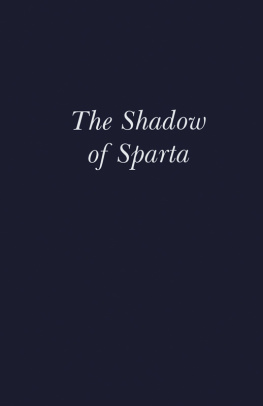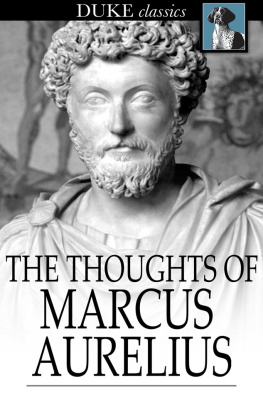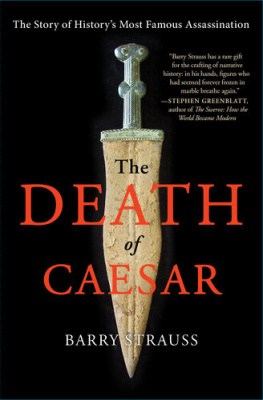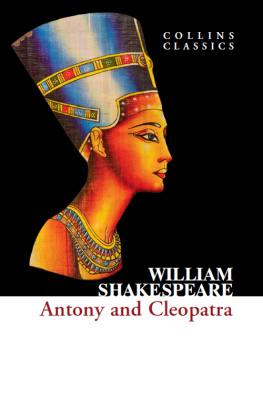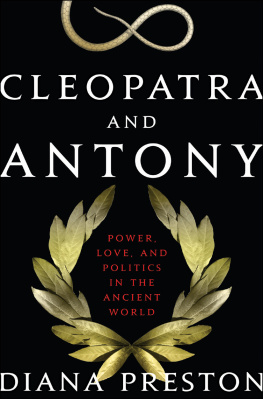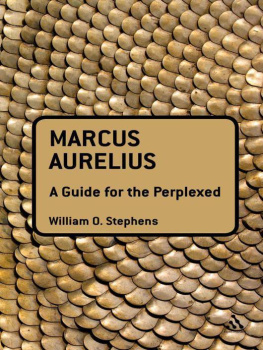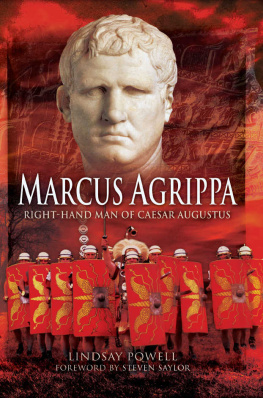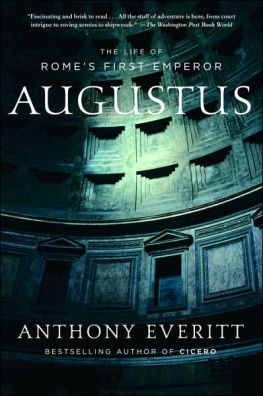
Other titles by Lindsay Powell
ALL THINGS UNDER THE SUN
How Modern Ideas Are Really Ancient
EAGER FOR GLORY
The Untold Story of Drusus the Elder,
Conqueror of Germania
GERMANICUS
The Magnificent Life and Mysterious Death
of Romes Most Popular General
COMBAT
Roman Soldier versus Germanic Warrior,
1st Century AD
For Mark,
Partner and Friend.
Contents
Foreword
by Steven Saylor
I first met Marcus Agrippa in the guise of a Scottish actor named Andrew Keir. The time was half a century ago. The place was a drive-in theatre outside the small town of Goldthwaite, Texas. The film was Cleopatra .
The historical figures in the movie made an indelible (indeed, life-changing) impression on me or at least some of them did. I would never forget Rex Harrison as Caesar, Richard Burton as Antony, and of course Elizabeth Taylor in the title role or for that matter, Roddy McDowalls waspish turn as Augustus. Even as a boy, I thought he was woefully miscast.
But Agrippa? Agrippa made almost no impression on me at all. Afterward I would vaguely recall a bristling (and historically questionable) beard, a gruff, military bearing, and lots of carping about Cleopatra (which in the context of the film made him one of the bad guys). A few years later, Andrew Keir would make a much stronger impression playing Dr. Quatermass, and my image of Agrippa would become hazier and more confused than ever.
You know what they say: you never get a second chance to make a first impression. And so, in my mind, Agrippa became relegated to the chorus of history, at best a bit player a drab workhorse in the business of empire-building, lacking the greatness of Augustus, the glamour of Cleopatra, the gory exit of Caesar, or Antonys tragic aura.
That view of Agrippa a minor player, dimly glimpsed in the background has been the standard view, not only in popular culture but in the work of historians. Things might have gone differently if Agrippas memoirs had survived, and we had his version of events. Very little written material passes through the ruthless sieve of time; a first-person account that happens to endure can go a long way to securing ones place in history. But Agrippas memoirs are lost.
Agrippas place in history might also be different had he lived in an earlier age. In the centuries before Agrippa, our histories of Rome are crammed with the exploits of swaggering generals, daring heroes, radical politicians, and even rebel slaves. Amid these figures, a man like Agrippa would surely have stood out. But Agrippa lived in, and helped to shape, the transitional period between the freewheeling Republic and the emperor-centric Principate. In the centuries after Agrippa thanks in no small part to his legacy the histories dilate upon the imperial succession, until all we can see are the emperors. Despite his pivotal role perhaps because of it Agrippa gets lost in the shuffle.
Lindsay Powell would seek to redress this situation. The result is the book you hold in your hands.
There has been no biography of Agrippa in English for almost eighty years. The time has come for a full-scale reassessment, and Powell has risen to the task, scrupulously researching the scattered sources and clearly explicating the complicated details of Agrippas long and eventful career. As a result, we now have a much clearer view of the right-hand man of Augustus.
But where is the human interest in this story? As Powell points out, Augustus and Agrippa lived one of the great buddy stories of history. (One of the most glaring false impressions left by the movie Cleopatra : the brusque, bearded Andrew Keir seemed almost a father figure to the callow Roddy McDowell. In fact, Agrippa and Augustus were almost exactly the same age.) Perhaps a bit selfishly, I like it when historians flesh out the past, bringing passion and zest to the dry dust of long-ago lives. It makes my job writing historical fiction that much easier.
More than once in his introduction, Powell refers to working like a detective to piece together the story of Agrippas life. Indeed, the working habits of the historian and the detective are not that far apart. The clues are widely scattered, and sometimes missing altogether, but the lure of the mystery draws us on because there is indeed a mystery at the heart of this story, as there is at the heart of every biography: who was Marcus Vispanius Agrippa?
Turn the pages and find out.
Steven Saylor
Berkeley, California
August 2013
Preface
A visitor to Rome will inevitably stop to admire the Christian Church of St Mary and the Martyrs in the Piazza della Rotonda. Better known as the Pantheon, this world famous temple was the great domed home of earlier pagan gods. Set upon towering columns of marble imported from Egypt, the ancient inscription on the entablature is cast in elegant bronze capitals. It begins with the name of its original builder, M. AGRIPPA. This fantastic building one of several erected by Agrippa in this part of the city was actually rebuilt by the Emperor Hadrian over a century and half later, after it had been destroyed by fire. Agrippas Pantheon probably looked very different, but it is telling that the famous builder of the great wall in remote Britannia chose not to put his own name on the temple but retained his antecedents. It was a mark of respect for the man who made it possible for Caesar Augustus to claim I found a city of brick and leave it one of marble (Cassius Dio, Roman History 56.30.3). It was one of many things Augustus relied on Agrippa to carry out for him during a lifetime of high adventure and exceptional achievement.
It is not stretching a point to say that without his devoted aide and indispensable deputy Augustus would never have been able to secure his position as leader of the Roman Empire by winning a devastating civil war, or to rule it as successfully as he did in peacetime. If there was ever someone who personified the term right-hand man he was M. Agrippa. From an early age, Agrippas fate was inextricably linked to the great nephew of the Perpetual Dictator Iulius Caesar. How the two men became best friends and together combined their talents to transform their world in turmoil is one of the great buddy stories of history.
Agrippa was a remarkable and multifaceted man who complemented his friend in age, outlook, personality and skills. He was a talented general on land and a fine admiral at sea, a pragmatic diplomat, a hard working public official, a generous philanthropist and the loyalest of friends. He was Augustus go-to guy, the man the boss turned to whenever he needed a difficult job done, whether it was beating tough guerillas in northern Spain or fixing creaking sewers in Rome. There were many times when he could have challenged Augustus and usurped power for himself, yet he did not. It seems he was never tempted. Intriguing to historians is to ponder the answer to the question of what drove him to sublimate his own desire for power and still put his life at risk when he had the means to take it and to be content with serving another? Or was it, in fact, that simple?
That life of selfless service put Agrippa in the forefront of world events. He was well connected and personally knew many of the great men of the age Iulius Caesar, Cicero, M. Antonius and King Herod. He was also probably the most travelled man of his age. By the end of his life there were few places in the Roman Empire which Agrippa had not personally visited. Augustus implicitly trusted his friends judgment and delegated him decision-making powers that finally matched his own. The result was that the world, which emerged from the bloody conflict following Caesars assassination into one of peace under the protector-ship of Augustus, was in large measure shaped by his right-hand man.



